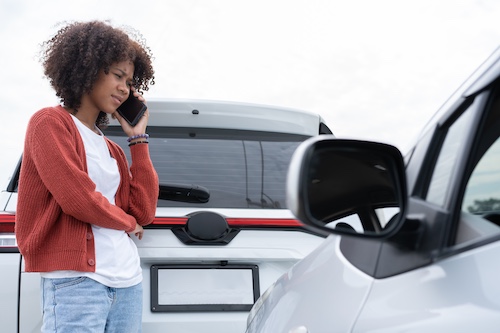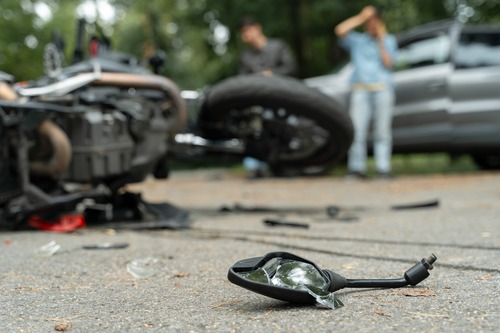Being in a car accident is stressful enough, but knowing what information to exchange at the scene of a car accident is key to protecting yourself and making the insurance claims process smoother. Exchanging the right information with the other driver is not only a legal requirement but also helps in resolving any disputes that may arise.
In this post, we’ll go over what to exchange after a car accident, how to deal with uncooperative drivers, and why you need to consult an Atlanta car accident lawyer to protect yourself.
Initial Steps in the Immediate Aftermath of an Accident
After a car accident, stay calm and follow the right steps in the immediate aftermath to ensure everyone’s safety and to get the necessary information for insurance and legal purposes.
Safety
First priority after any accident is safety. Check on everyone in your vehicle and if possible move to a safe area to avoid further danger. Stay calm and don’t make any sudden movements or decisions. If injuries are involved call 911. Even in minor accidents use your hazard lights to alert other drivers and prevent further accidents.
Check on the Other Driver
Once you’ve checked on your passengers, approach the other driver calmly. Ask if they’re okay and offer help if needed. Keep a professional and polite tone even if things are heated. This can prevent escalation and help with information exchange. If the other driver is impaired or gets aggressive, prioritize your safety and wait for law enforcement to arrive before you engage further.
Call 911 if needed
If there are serious injuries, visible damage or signs of impaired driving call the police right away. In many states calling the police is required for accidents with injuries or significant property damage. The responding officers will help mediate between the parties and create an official report which is often needed for insurance claims and legal purposes.
Get Basic Information
Before you leave the scene, start getting basic information from the other driver, including their name, contact info, insurance details, and vehicle information. Keep the conversation focused on facts not fault as determining fault is usually left to the insurance companies or law enforcement. Be polite and professional throughout the process.
What to Exchange
Exchanging the right info after an accident, including exchanging insurance information, is key to a smooth insurance claims process and avoiding legal headaches.
Personal Information
After everyone is safe, the next step is to exchange personal information with the other driver. This includes full names, addresses, and phone numbers. Make sure to verify the spelling and get all contact info correct. If there are passengers or witnesses get their names and contact info as well. Having personal information correct is crucial for insurance claims and follow-up.
Driver’s License
Ask for the driver’s license number of the other driver. They may not give it to you but this info helps verify identity and ensures you’re dealing with a licensed driver. If law enforcement is present they can help get this info. Make sure to get the spelling of the driver’s name correct to avoid discrepancies later on.
Vehicle Information
Next is the vehicle info. This includes the make, model, year, and color of the vehicle. Also, the license plate number is important for both insurance and legal purposes. If possible ask for the Vehicle Identification Number (VIN) which is usually found on the dashboard or inside the driver’s side door. This helps in identifying the vehicles for claims.
Insurance Information
Exchanging insurance info is one of the most important steps. Make sure to get the name of the other driver’s insurance company, the policy number, and if applicable, the name of the policyholder. Sometimes the driver may not be the policyholder, so make sure you get the correct policyholder info. This will make the claims process easier for both insurance companies involved.
Police Report Information
If law enforcement is called to the scene get the info from the police report. Ask for the officer’s name, badge number, and report number as this will be needed when filing insurance claims. Having a police report can also help avoid disputes on fault or damage estimates later on.
Uncooperative Drivers
When dealing with an uncooperative driver after an accident make sure to handle the situation carefully to ensure your safety and get the info for your insurance claim.
Stay Cool and Don’t Escalate
Dealing with an uncooperative driver can be annoying but you must stay cool and don’t escalate. Even if the other driver refuses to give info or gets confrontational stay professional. Reacting aggressively can make the situation worse and complicate the claims process. Focus on your goal: get the info.
Call Law Enforcement
If the other driver refuses to give info or is being difficult, calling law enforcement is the next step. Police officers are trained to handle this situation and can help get the info, including identifying the at-fault driver. In most states, you are required to report accidents with injuries or significant damage. The police report will have the other driver’s info which you can use if they won’t cooperate.
Document
While waiting for law enforcement use this time to document the scene of the accident. Take pictures of the vehicles, damage, and the surrounding area. Take a picture of the license plate of the uncooperative driver’s vehicle too. Having this documentation will help support your claim if the other driver won’t cooperate.
Don’t Engage Directly
If the other driver is hostile or aggressive don’t engage directly. Your safety is a priority and law enforcement will handle the situation. Stay back and let the officers mediate the exchange of info. They are trained to de-escalate and make sure all parties give the required info.
Technology and Tools
Technology has many tools that can make documenting and reporting accidents easier and faster to get and share the info.
Mobile Apps for Insurance Claims
Many insurance companies now have mobile apps that can simplify the insurance claim process, including reporting and documenting accidents. These apps allow you to upload photos, record details and even submit claims right from the scene. Using these tools ensures the info reaches your insurance provider fast and the overall claims process is faster. They also store policy info so you don’t need to exchange physical cards with the other driver.
Document with Smartphones
Smartphones are now essential at accident scenes. Use your phone to take clear photos of the damage to all vehicles, license plates, and the overall accident scene. Also capture any road conditions, signage, or weather that may have contributed to the accident. Video footage can be helpful too. This visual evidence is key in determining fault or defending against disputes later in the claims process.
GPS and Timestamp
Most smartphones automatically log the time and location when you take a photo so you have an extra layer of evidence. GPS data from your phone can pinpoint the exact location of the accident and timestamped photos can show the sequence of events. This data is super helpful in case there’s a dispute about what happened or where the accident occurred.
Digital Information Exchange
In some cases, it’s better to exchange info digitally. Many drivers prefer to take photos of each other’s driver’s licenses, insurance cards, and vehicle details. This way it’s more accurate and reduces the chance of human error when writing down info by hand. If the other driver agrees you can use this method to make the info exchange faster and more efficient.
Consult With an Experienced Atlanta Car Accident Attorney Today!
If you’ve been involved in a car accident and need help navigating the insurance claims process or dealing with personal injury legal challenges, don’t hesitate to reach out to Atlanta Metro Law. Our team can assist you with filing a personal injury claim to secure the compensation you deserve. Our team is here to provide you with the support and guidance you need to protect your rights and secure the compensation you deserve.
Contact us at 864-894-2045 for a free case consultation!





